Geopolitical and AI Challenges in an Unstable World: Insights from the Paris Peace Forum
Politicians, civil society activists, business leaders, journalists and scholars gathered for the 7th Peace Forum in central Paris last week, seeking answers to what organizers suggested is a dysfunctional world order. The debates and presentations were closely followed by an HEC delegation of 20 students who enjoyed lively exchanges with Ministers and state leaders around geopolitics, business and AI.
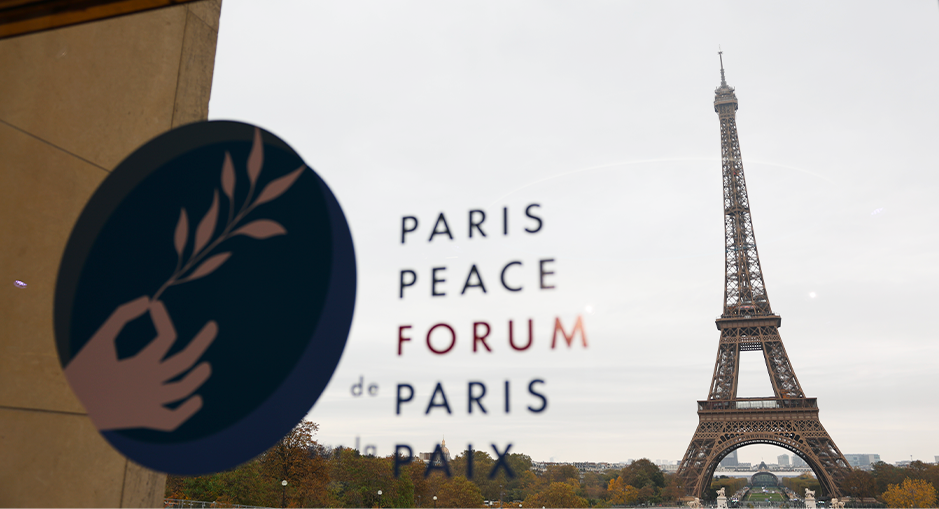
After her roundtable, Gabriela Ramos issued a stark warning. The Assistant Director-General for Social and Human Sciences at UNESCO repeated it like a mantra: "We’re off track in delivering on global priorities like reducing inequalities and advancing gender equality,” she told HEC. “Without urgent changes, the technology we celebrate today could exponentially deepen the fractures in our societies."
Her observation set the tone for two days of intensive dialogue at Paris Palais de Chaillot, where global leaders and actors gathered to confront pressing challenges ranging from geopolitical instability to the ethical dilemmas posed by artificial intelligence (AI). Under the theme “Wanted: A Functioning Global Order,” the Forum sought not only to diagnose mounting crises but to champion actionable solutions.
Bridging Global Divides
At the heart of this year’s discussions was the challenge of mending fractured international relations in an increasingly divided world. Donald Trump’s return to the White House loomed large over conversations about the future of multilateralism, as U.S.-China tensions are intensifying and conflicts in Ukraine, Gaza, and Sudan are reshaping the geopolitical landscape. Dr. Justin Vaïsse, Director-General of the Paris Peace Forum, described the stakes in harsh terms: “Global governance is severely hampered by these divisions. Without cooperation, the stewardship of public goods like climate, AI, and economic stability becomes impossible.”
While the devastating conflicts in Gaza, Lebanon and Ukraine continue to dominate global media coverage, the ravages of war in Sudan are largely sidelined. Sudanese billionaire Sir Mo Ibrahim made a rare public appearance to give an impassioned plea for international intervention to halt escalating violence in his country: “We have to put ideology to the side and push the United Nations and the African Union to put boots on the ground,” he told the Forum audience with passion. “If we don’t end hostilities by drying up arm sales and illicit support to both sides, Sudan will disintegrate into fiefdoms, provoking a tsunami in the region. It will become a no man’s land; a million refugees will flee and tens of thousands of civilians will die. This is a challenge to our very notion of multilateral action and the UN must act.” Worrying words, backed by a just-released study revealing that in the Khartoum region alone the death toll has spiraled up by 50% in the 14 months of civil war. There is an estimated 150,000 deaths and 11 million people have been displaced. Amnesty International has also found evidence that military equipment built by French companies like Galix System, KNDS and Lacroix Défense is being used “in violation of the UN arms embargo” of Darfur.
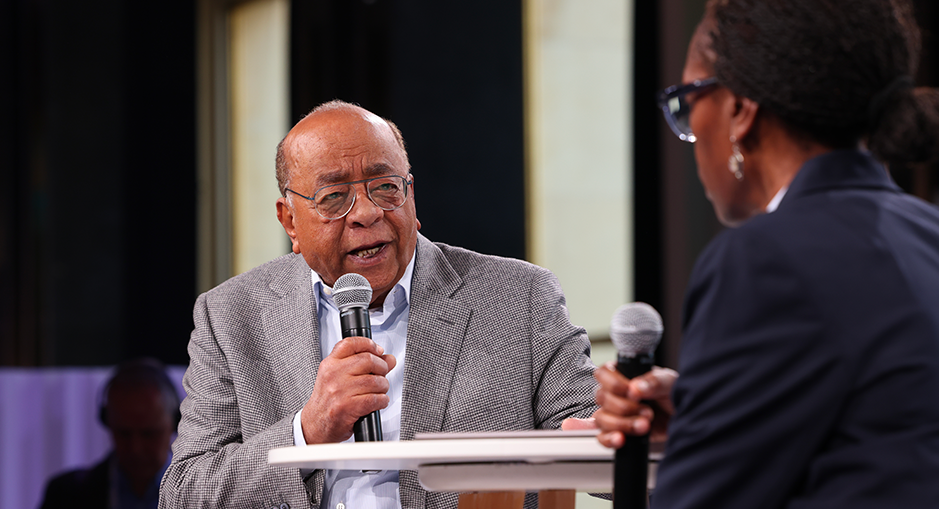
Sir Mo Ibrahim, co-founder and co-chair of the Africa-Europe Foundation
New Pact for People and Planet
Jean-Noël Barrot, France’s Minister for Europe and Foreign Affairs, was omnipresent at the Paris Forum as he unveiled the Paris Pact for People and the Planet. The framework, which aims to lift 600 million people out of poverty while tackling inequality and climate change, emphasized collaboration over conflict. In an exclusive exchange with HEC, the school’s former professor in finance said: “This is a key event for partners from around to world to come up with innovative solutions because this forum is not only a moment where people think, it’s also a moment where people act. The Peace Forum is an incubator, and the seventh edition explored key concepts such as the reform of multipartyism and of international organizations, as well as AI, climate and oceans.”
Yet, as Gabriela Ramos pointed out, no initiative will succeed without addressing the technological drivers of inequality. “AI and other technologies have the potential to amplify existing disparities unless we act swiftly to implement ethical frameworks and policies,” said the Harvard alumna. Ramos warned that technology is often developed and deployed without consideration of its environmental, social, or cultural impacts, particularly in under-resourced regions. The technology is fine, it will develop or survive. The real question is what kind of policy frameworks, what kind of economic incentives, what kind of markets do we need for these technologies to help us address the lack of sustainability even while we’re developing technologies?”
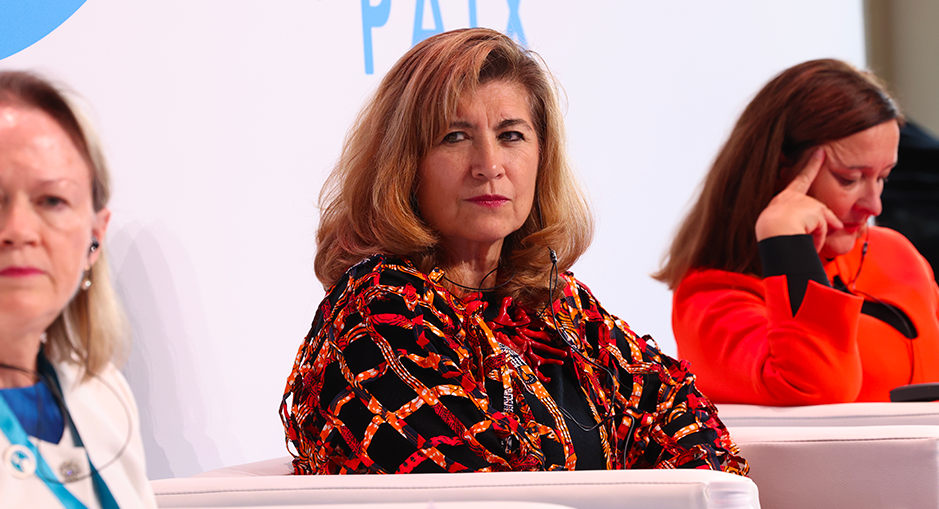
AI: Opportunity and Peril
Indeed, few topics generated as much debate at the Forum as the future of AI. It augurs well for the February 2025 AI Action Summit in Paris. This will confront government policies with the visions of representatives of academia, NGOs, artists, members of civil society and company CEOs. While its potential to address issues like climate change and public health is undeniable, the technology also raises profound ethical and governance challenges. Yi Zeng, a Chinese expert on AI ethics, highlighted the urgent need for coordinated global efforts to manage these risks. “No single country can lead AI governance because no one knows all the answers,” Zeng said. The co-director of the China-UK Research Centre for AI Ethics and Governance pointed out that his country’s vertical approach to regulating specific AI applications, such as generative algorithms and driverless cars, complements the EU’s more comprehensive, umbrella-style legislation. “This diversity in approaches is necessary. AI governance must be a mosaic of strategies that reflect regional needs while building toward a global consensus. For issues as critical as military AI or catastrophic risks, international coordination is our only safeguard.”
One of Zeng’s more provocative points centered on the existential risks posed by AI, including its misuse in warfare. “Military AI systems, if unregulated, could become the ultimate threat - not just to nations, but to humanity as a whole,” he cautioned. His remarks sparked intense debate about the role of institutions like the United Nations in creating enforceable global AI norms.
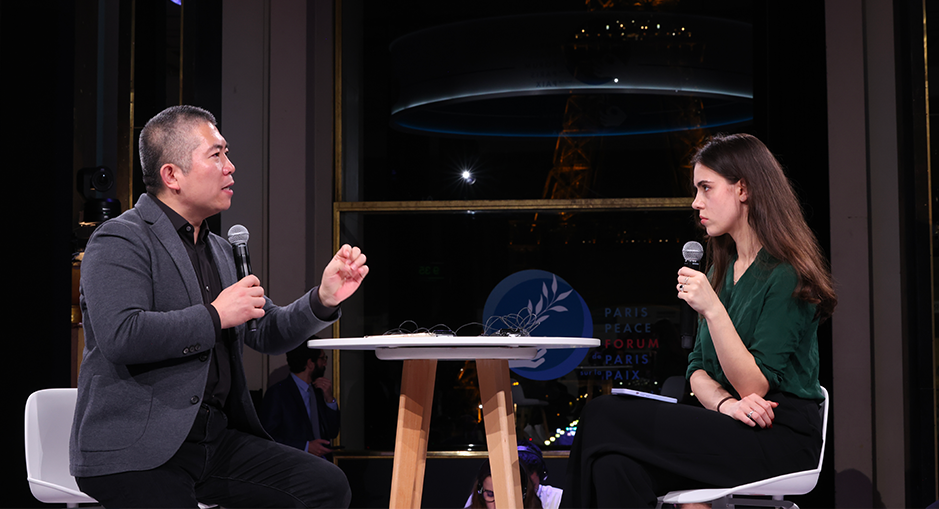
Echoing Zeng on the risks of unregulated use of AI, Kate Kallot provided a ground-level perspective from Africa. Kallot is CEO of Amini, a rapidly expanding company in Nairobi, Kenya, seeking to transform Africa’s data capacity and infrastructure. At the Forum, she highlighted the scarcity of data and compute infrastructure on the continent and advocated for policies that empower local developers. “AI innovation in Africa comes from the ground up: startups, hackathons, and communities solving challenges relevant to their contexts,” Kallot said. The entrepreneur, who was named by Time magazine as one of 100 most influential people in AI, has long been urging global summits to ensure that those driving grassroots innovation are included in policymaking discussions. Kallot, whose company builds environmental data infrastructure in Africa, provided an on-the-ground perspective. “The misconception that Africa lacks talent in AI is not just false - it’s harmful,” she said. “I came back to my homeland and was blown away. There are brilliant developers and scientists across the continent driving innovation from the ground up. They don’t need top-down solutions; they need access to compute infrastructure, data, and funding.”
A Holistic Approach to Sustainability
Environmental concerns featured prominently in the Forum’s AI discussions. In a frank exchange, UNESCO’s Gabriela Ramos called for an urgent reassessment of AI’s environmental footprint, highlighting its enormous energy consumption and resource demands. “AI is a glutton for energy,” she told us bluntly. “But instead of discarding it, we must channel its capabilities toward solving environmental challenges. Imagine if AI could be used to optimize water usage or predict climate patterns more accurately. The potential is transformative, but only if paired with sustainability frameworks.”
French Delegate Minister for Energy Olga Givernet added to this conversation by emphasizing the need for energy-efficient AI models and infrastructure. She advocated for what she called a “principle of frugality” which would include circular systems such as reusing heat generated by data centers, to minimize waste. “We must embed environmental accountability into the DNA of technological innovation,” she argued. “This would enable us to find a virtuous circle around consumption.”
The Forum also explored the intersection of AI and agriculture, with projects like Africa’s ATLAS (Agricultural Transitions Lab for African Solutions) initiative demonstrating how technology can drive sustainable food systems. The initiative was launched by the Peace Forum in June 2024 and brings together 25 major institutions from round the world. By focusing on region-specific solutions, such efforts illustrate how AI can be both innovative and inclusive.
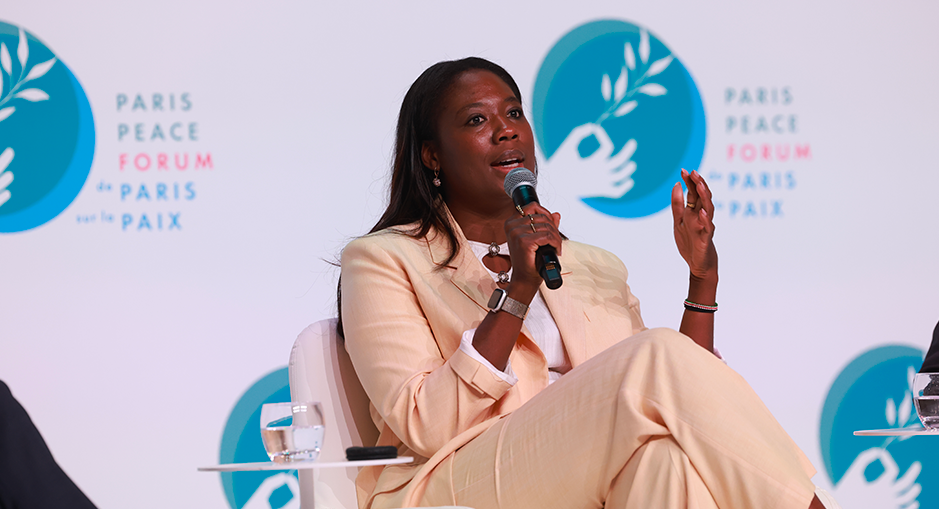
Building Ethical AI Ecosystems
Gabriela Ramos and Yi Zeng both stressed the need for ethical frameworks that go beyond lofty declarations. For Ramos, this means translating UNESCO’s global recommendations on AI ethics into actionable national policies. “It’s easy to draft principles; the real challenge is implementation,” she said. Zeng advocated for greater openness in AI development, aligning with Martin Tisné’s call to prioritize transparency and collaboration. Tisné is the CEO for AI Collaborative, an initiative devoted to advancing AI in the public interest. “Openness doesn’t just mean open-source software,” Zeng explained. “It means creating systems where policymakers, civil society, and developers work together to ensure AI serves societal needs. Without this, we risk creating technologies that answer only to profit.”
Grassroots initiatives were another feature of the Forum. The Scale-Up Program, now in its seventh year, showcased ten civil society projects aimed at tackling issues from gender-based violence to climate change. One standout project combines First Nation practices with AI to protect biodiversity in Latin America. Another, spearheaded by the CyberPeace Institute, mobilizes cybersecurity volunteers to protect NGOs from cyberattacks. At the Forum, Tisné praised these efforts, emphasizing the importance of breaking down silos. “There’s no shortage of good projects,” he said. “The challenge is fragmentation. Too often, initiatives operate in isolation, limiting their impact. Collaboration is the only way forward.”
Academic Partnerships for Peace
The Forum’s commitment to fostering collaboration extended to its new partnership with HEC Paris. As a Knowledge Partner, HEC Paris will contribute academic expertise to the Forum’s mission of addressing these global challenges. The partnership will debut with the Business & Peace Academy in January 2025, a three-week program designed to equip students with the skills to promote responsible business practices in conflict zones. Andrea Masini, Dean of Faculty at HEC Paris, described the initiative as “a groundbreaking opportunity to bridge academic research with real-world impact.” For the organizers, this collaboration reflects the Forum’s broader goal of integrating diverse perspectives - academic, political, and grassroots - into its governance solutions.
Toward a More Functional Global Order
As the Paris Peace Forum concluded, its participants left with a renewed sense of urgency. The discussions underscored the complexity of creating a more equitable and sustainable world. Gabriela Ramos offered a final reflection: “We must imagine the world we want, not the one we fear. The frameworks we build today will determine whether technology becomes a tool for inclusion or division.”
In an era defined by fragmentation, the Paris Peace Forum claims to challenge global actors to envision - and work toward - a functioning global order. This 2024 edition sought to reach this objective through lively debates over geopolitical crises, AI ethics, academic partnerships and grassroots initiatives. Time will tell if this incremental approach will be effective
(All pictures © Frederic Bukajlo, Marie Etchegoyen, Laurent Hazgui / Capa Pictures for Paris Peace Forum 2024)